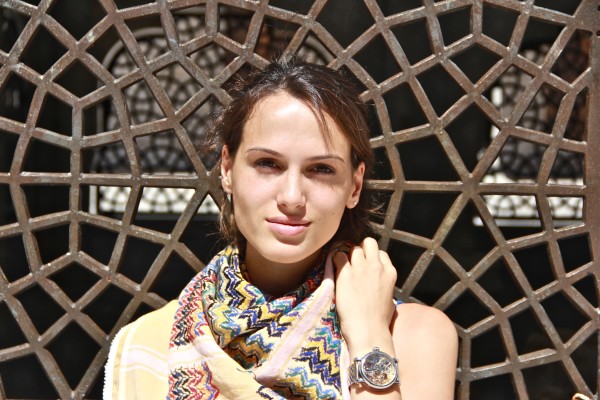
12 Feb The Short Version: Executive Order, “Enhancing Public Safety”
The point of it all is to break down the headlines, the week’s most controversial issues, determine why a particular issue is important to you, and reveal the best arguments on each side of the story.
By reading Cleo Abram’s The Short Version, you join a vibrant group of people with two simple beliefs: 1) Every important issue can and should be discussed in a way we all can understand; 2) Understanding both sides makes us more thoughtful and our views more informed.
In some of the most recent iterations of The Short Version, Cleo Abram examined “The Trump Dossier,”considering both sides of the argument as to whether or not BuzzFeed should have released as yet unsubstantiated allegations about our new president. Last week, Cleo explored the controversy around the immigration executive order. This week, she looks at sanctuary cities wondering whether or not they should comply with the president’s executive order.
Note: In general, if you have missed any of Cleo’s blogs, just go to our Home Page, type “The Short Version” into Search (magnifying glass icon) and poof, like magic, all her blogs will appear.
“I love getting feedback every week—thank you! If you want come hang out, debate a thing or two, and meet other Shorties, check out Short Events,” says Cleo. “Or if you have a topic you’d be interested in guest writing, just let me know! Let’s make it happen.”

Cleo Constantine Abram of the “Short Form,” offering densely packed spins on issues of national and global importance.
What’s happening?
This week from Monday morning to Friday at noon, immigration officials conducted raids in at least six states, arresting hundreds of undocumented immigrants.
Though officials from Immigration and Customs Enforcement (ICE) say the raids were “routine,” their size and scope reflect new rules under President Trump’s recent executive order. The order, “Enhancing Public Safety in the Interior of the United States,” significantly expands how we enforce immigration laws domestically. (It’s separate from another controversial immigration order that banned entry from seven Muslim-majority countries.)
For example, these raids seem to have targeted people with and without criminal records, which makes them different from similar actions under President Obama.
ICE confirmed that raids took place in New York, California, Georgia, Illinois, North and South Carolina. Activists also documented raids of “unusual intensity” in Florida, Kansas, Texas, and Virginia.
Why is it important?
These raids are the first hint at how the federal government will enforce this new executive order. The order gives officials the power to cast a much wider net than they could under President Obama—who in turn deported more people than any other president before him.
The order also outlines severe measures against “sanctuary jurisdictions,” saying that “jurisdictions that willfully refuse to comply” will not be eligible for nearly $27 billion in federal funds. But this is much more complicated than it might seem: there are many ways to define what are commonly called “sanctuary cities,” and many different regulations and responsibilities that support these cities’ behavior.
The controversy over sanctuary cities gets to the core of an amorphous debate about immigration and enforcement. After undocumented immigrants are already living in the U.S., do we choose who can stay? Who enforces that decision?
Much of the debate is around how long local jails will hold undocumented immigrants after they would normally be released—but it isn’t local police’s responsibility to enforce federal law. How should cities weigh cooperating with federal law versus what they think is important for local public safety?
Debate it!
Should sanctuary cities comply with President Trump’s executive order?
Why “The Short Version” on TIO:
Nine+ ago, Telluride Inside…and Out began as a lifestyle webzine. Today, in the full knowledge that Telluride is a window on the world, we continue to bring the “zazz” (short for “pizzazz) of the region to a local, national, and global audience by covering everything from Telluride’s robust cultural economy – major events and festivals – to health and fitness and outdoor adventure. When Telluride travels, we write about places to go, people to meet too. (That’s part of the “Out” part of our handle, the other, obviously, Outdoors.)
And now, this new weekly column, “The Short Version,” which offers simple summaries of issues of national and global importance. (Though we won’t go political, or rather we won’t show bias.)
“The Short Version” is written by Cleo Constantine Abram, the daughter of Telluride locals Eleni Constantine and Jonathan Abram (and therefore an honorary local and regular visitor) and a digital strategist.
Why “The Short Version”? Because, though we live in Shangri-La, our bubble is not impermeable and the rest of the world is only a click away. Because there is no inconsequential action; only consequential inaction. And because information is power in a moment so many of us are feeling powerless.
More about Cleo Constantine Abram:

Cleo grew up in Washington D.C., lives in New York City, and loves to visit her parents in Telluride. She authors “The Short Version,” a newsletter that explains each week’s most important issue and both sides of the debate around it.
Cleo is a digital strategist now working at Vox, a general interest news site for the 21st century. Its mission is simple: Explain the news. Politics, public policy, world affairs, pop culture, science, business, and more.
Cleo’s work focuses on ways to share, educate, and inform using online platforms. While in college at Columbia University, she guided the school’s entrance into online education through her role as the youngest elected representative to the Columbia Senate, which makes university-wide policy.
She continued her work on online education at TED-Ed, the educational branch of the nonprofit, building new programs and online tools to support high school teachers worldwide.
Continuing her work with TED, Cleo founded and led an early TEDx conference, the organization’s community-specific series.
Most importantly, Cleo loves to ski.


Sorry, the comment form is closed at this time.